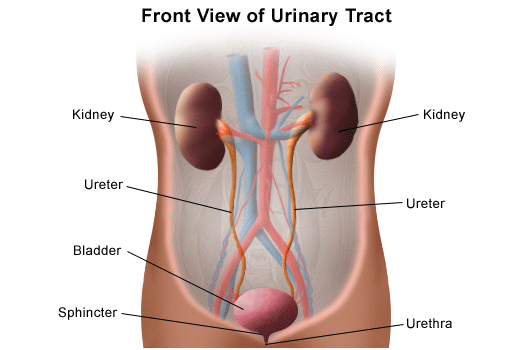Bladder Cancer Treatment

Urinary Tract Diversion
Prior to recently, the majority of patients with bladder cancer
who underwent cystectomy—the removal of
the bladder—needed an ostomy (the surgical construction of an artificial opening) and an external bag
to collect urine.Newer reconstructive surgical methods include the
continent urinary reservoir, the neobladder, and the ileal conduit. A portion of the colon (large intestine)
is used to create an internal pouch to retain urine as part of the continent urinary reservoir urinary
diversion procedure. The pouch has been modified specifically to stop urine from backing up into the
kidneys and ureters, which transport urine from the kidneys
to the bladder. A band-aid can readily hide
the stoma site as the patient drains the pouch multiple times each day with a catheter.
In order to restore the patient's ability to urinate as previously, the neobladder procedure includes suturing an
intestinal pouch comparable to the urethra.
Complications of theBowel (intestinal) obstruction, blood clots, pneumonia (lung inflammation), ureteral reflux
(back-flow), and ureteral blockage are complications of the continent urine reservoir and neobladder.
The ileal conduit is a urinary channel that is surgically created from a small piece of the patient's
bowel. During this procedure, the ureters are attached to one end of the bowel segment and the other end
is brought out of the surface of the body to make a stoma. The stoma is connected to an external, urine-collecting
bag that must be worn at all times. Bowel obstruction, urinary tract infection
(UTI), blood clots, pneumonia, upper urinary tract injury, and
skin deterioration around the stoma are all risks associated with the ileal conduit surgery.
Prognosis
Superficial bladder cancer has a 5-year survival rate of about 85%. Invasive bladder cancer has a
less favorable prognosis. Approximately 5% of patients with metastasized bladder cancer live 2 years
after diagnosis. Cases of recurrent bladder cancer indicate an aggressive tumor and a poor prognosis.
Prevention
Bladder cancer cannot be prevented. Avoiding smoking is the best method to minimize the risk. According to studies, regularly consuming a lot of fluids
reduces the incidence of bladder cancer.
Previous
Top